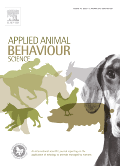
APPLIED ANIMAL BEHAVIOUR SCIENCE
Scope & Guideline
Transforming animal welfare through cutting-edge research.
Introduction
Aims and Scopes
- Animal Welfare Assessment:
Research often aims to develop and validate methods for assessing animal welfare through behavioral indicators, physiological responses, and environmental factors. - Human-Animal Interaction:
Studies frequently explore the dynamics of human-animal relationships, including how human behavior influences animal welfare, training, and socialization. - Cognitive and Behavioral Studies:
The journal publishes research on cognitive abilities and behavioral patterns, examining how these traits affect animal management and welfare outcomes. - Enrichment and Environmental Impact:
A significant focus is placed on environmental enrichment strategies and their effects on animal behavior and welfare, highlighting the importance of habitat complexity. - Species-Specific Behavior:
Research spans a variety of species, from companion animals to livestock and wildlife, providing insights into species-specific behaviors and needs. - Ethological Approaches:
The journal encourages the use of ethological methods to study animal behavior in naturalistic settings, contributing to the understanding of behavioral ecology.
Trending and Emerging
- Impact of Environmental Enrichment:
Recent publications increasingly focus on the role of environmental enrichment in enhancing animal welfare, with studies investigating various enrichment strategies across species. - Human-Centric Animal Welfare:
There is a growing emphasis on understanding how human behaviors, interactions, and societal perceptions influence animal welfare, particularly in companion animals. - Technological Integration in Behavior Studies:
The use of technology, such as accelerometers and automated monitoring systems, is on the rise, allowing for more precise and comprehensive data collection in behavioral studies. - Cognitive and Emotional Assessment:
Research is trending towards assessing cognitive abilities and emotional states in animals, which are crucial for developing effective welfare assessments. - Interdisciplinary Approaches:
There is an increasing trend towards interdisciplinary research that combines insights from psychology, ethology, and human-animal studies to address complex welfare issues. - Focus on Social Dynamics:
Emerging studies are delving into the social dynamics of animals within groups, examining how social structures influence behavior and welfare outcomes.
Declining or Waning
- Traditional Training Methods:
There appears to be a waning interest in traditional training methods for companion animals as research increasingly emphasizes positive reinforcement and humane training techniques. - Single Species Studies:
Research focusing exclusively on single species has declined, with a growing trend towards comparative studies that examine behavioral interactions across species and their implications for welfare. - Behavioral Genetics:
While behavioral genetics remains important, studies specifically linking genetics to behavior in a limited context are less frequently published, possibly due to the complexity of interactions with environmental factors. - Long-Term Observational Studies:
There has been a noticeable decrease in the publication of long-term observational studies, potentially due to the increasing emphasis on experimental and intervention-based research. - Stereotypic Behavior Analysis:
Research on stereotypic behaviors, while still relevant, is being overshadowed by studies focused on proactive welfare measures and positive behavioral outcomes.
Similar Journals

Translational Animal Science
Exploring the Frontiers of Animal Science and Veterinary InnovationsTranslational Animal Science, published by Oxford University Press Inc, stands as a prominent journal in the fields of Animal Science and Zoology as well as Veterinary Sciences, achieving a commendable Q2 ranking in both categories for 2023. With an E-ISSN of 2573-2102 and transitioning to an Open Access model since 2017, this journal fosters accessibility and dissemination of vital research that bridges the gap between basic animal science and its practical applications. The journal's significant impact factor, where it ranks in the 71st and 65th percentiles respectively for Veterinary and Agricultural and Biological Sciences disciplines, highlights its importance as a resource for emerging trends and innovations in animal research. With submissions accepted until 2024, Translational Animal Science not only contributes to advancing knowledge but also aims to engage a broad audience of researchers, professionals, and students dedicated to improving animal health and welfare. Based in India, the journal serves as an essential platform for the exchange of scientific ideas that facilitate progress within these vital fields.

Journal of Zoo and Aquarium Research
Championing ecological sustainability through scholarly communication.Journal of Zoo and Aquarium Research is an esteemed publication dedicated to advancing the field of zoology and aquatic sciences. Published by the European Association of Zoos & Aquaria (EAZA), this journal provides a dynamic platform for sharing groundbreaking research, best practices, and conservation efforts within zoos and aquariums, making it an invaluable resource for researchers, professionals, and students alike. With an increasing focus on the importance of biodiversity and sustainable practices, the journal is committed to fostering scholarly communication that enhances the understanding of animal care, species conservation, and habitat preservation. Although specific metrics such as impact factor and HIndex are currently unavailable, the journal's rigorous peer-review process ensures that only high-quality research is disseminated. As an open-access publication, the Journal of Zoo and Aquarium Research promotes accessibility to vital information, encouraging a broader engagement with critical issues in wildlife conservation. By addressing contemporary challenges in the field, this journal stands as a pivotal resource for those dedicated to promoting animal welfare and ecological sustainability.
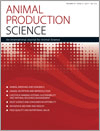
Animal Production Science
Innovating Insights for Food Security and Animal WelfareAnimal Production Science, published by CSIRO PUBLISHING, is a prestigious journal that caters to the fields of Animal Science and Food Science. With an ISSN of 1836-0939 and an E-ISSN of 1836-5787, the journal features high-quality research and reviews that are crucial for advancing the understanding and innovation of animal production systems. Recognized within the Q2 category of both Animal Science and Zoology, and Food Science, as per the 2023 Journal Rankings, Animal Production Science has achieved commendable Scopus rankings, placing it in the 68th and 48th percentiles in its respective categories. With converged years from 2009 to 2024, and an aim to disseminate knowledge that promotes sustainable practices, the journal is pivotal for researchers, professionals, and students devoted to animal production and food security. Exploring topics from livestock management to food quality, the journal offers valuable insights for enhancing productivity while considering welfare and environmental impact. For those seeking accessibility, the journal provides various open access options, encouraging a wider reach of its scholarly articles.
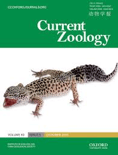
Current Zoology
Connecting Researchers to the Heart of Animal ScienceCurrent Zoology, published by Oxford University Press, is a leading open-access journal dedicated to advancing the field of zoology and animal science since its establishment in 2009. With an impressive Q1 ranking in Animal Science and Zoology as of 2023, the journal maintains a prominent position within the academic community, supported by a ranking of #138 out of 490 in Scopus. Current Zoology serves as a vital platform for researchers, professionals, and students, showcasing high-quality research that spans a broad array of topics within the domain of zoology. This journal is characterized by its rigorous peer-review process, ensuring the dissemination of credible and impactful findings that contribute to the understanding of animal biology and conservation efforts. The open-access model enhances accessibility, allowing a wider audience to engage with the pivotal research being conducted in this dynamic field. Processing all manuscripts in an efficient manner and featuring articles that push the boundaries of current knowledge, Current Zoology is your gateway to explore innovative discoveries and trends in zoology.

ZOOLOGICHESKY ZHURNAL
Unveiling the mysteries of behavior and systematics in the animal kingdom.Zoologichesky Zhurnal, a prominent journal in the field of Ecology, Evolution, Behavior and Systematics, has been a vital publication since its inception in 1950. Published by MAIK Nauka-Interperiodica in the Russian Federation, this journal has established a notable reputation in disseminating scientific research and advancing knowledge in zoology. With its coverage spanning from 1950 to 2023, and a specific convergent focus during 1982-1983, this journal contributes significantly to the ecological and evolutionary sciences, even though it currently holds a Q4 classification in the 2023 category quartiles, indicating its niche positioning among peers. Researchers and students engaged in the study of biological sciences, particularly those interested in the dynamics of ecosystems, behavior of species, and evolutionary processes, will find valuable insights and original research articles within its pages. While access to this esteemed journal is not open, it remains an essential resource for those seeking to deepen their understanding of zoological sciences.

TROPICAL ANIMAL HEALTH AND PRODUCTION
Elevating standards in tropical animal care and production.Tropical Animal Health and Production is a prominent academic journal dedicated to advancing the field of animal health and production in tropical environments. Published by Springer, this journal has been a pivotal platform for researchers and professionals since its inception in 1969, serving as a vital resource for innovative studies and advancements up to 2024. With impactful research findings, it holds a respectable Q2 ranking in both Animal Science and Zoology, and Food Animals, demonstrating its significance within these fields. The journal’s commitment to high-quality research is further reflected in its Scopus rankings, with a notable position in Agricultural and Biological Sciences and Veterinary Food Animals. Although it is not an open-access publication, the insights and knowledge shared within its pages are invaluable for those engaged in tackling the challenges of animal health and production in the tropics. Researchers and students will find Tropical Animal Health and Production an essential source for the most recent advancements and practices in veterinary science and animal care for food-producing species.
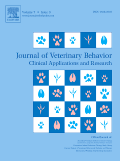
Journal of Veterinary Behavior-Clinical Applications and Research
Exploring the science behind veterinary behavior.The Journal of Veterinary Behavior-Clinical Applications and Research, published by Elsevier Science Inc, is a premier outlet for original research and clinical studies in the field of veterinary behavior. With an ISSN of 1558-7878 and an E-ISSN of 1878-7517, this journal serves as an essential resource for veterinarians, animal behaviorists, and researchers dedicated to understanding and improving animal welfare through behavioral science. The journal holds a respectable Q2 ranking in the Veterinary (miscellaneous) category as of 2023, attesting to its significant impact in the field. Although it does not offer open access options, it fosters a community of professionals who are passionate about advancing the application of behavioral research in clinical settings. With coverage extending from 2006 to 2024, the journal aims to disseminate valuable insights that contribute to effective behavior management and intervention strategies, ultimately enhancing the relationship between animals and their caregivers.

ANIMAL BIOLOGY
Pioneering Studies in the Dynamic World of Animal BiologyANIMAL BIOLOGY is a distinguished journal published by BRILL, focusing on the dynamic fields of Animal Science and Zoology, as well as Ecology, Evolution, Behavior, and Systematics. With an ISSN of 1570-7555 and an E-ISSN of 1570-7563, this quarterly journal serves as a pivotal platform for researchers and professionals seeking to contribute to the understanding of animal biology across diverse ecological contexts. The journal is recognized with a 2023 Scopus ranking of #234 out of 490 in the Animal Science and Zoology category, placing it within the 52nd percentile, alongside a rank of #409 out of 721 in Ecology, marking a solid contribution to the field. Although it currently holds a Q3 quartile in both categories, its commitment to quality research and novel insights continues to bolster its significance within the academic community. The open access option coupled with its publication history from 2003 to 2024 ensures a wide dissemination of knowledge, drawing in a global audience of researchers, professionals, and students eager to explore the intricacies of animal biology. By promoting high-quality discussions and innovative studies, ANIMAL BIOLOGY plays an essential role in advancing the understanding of life sciences and the evolution of biodiversity.

BELGIAN JOURNAL OF ZOOLOGY
Fostering Knowledge and Discovery in Zoology.The BELGIAN JOURNAL OF ZOOLOGY, published by the Royal Belgian Zoological Society, serves as a prominent platform for advancing research in the field of zoology. With an impact factor reflecting its status within the academic community, this journal rigorously publishes innovative studies and reviews, covering a broad spectrum of topics related to animal science and zoology. As an esteemed outlet, the journal ranks in the Q2 category for both Animal Science and Zoology, demonstrating its relevance and contribution to the field, as indicated by its Scopus ranking of 255 out of 490. Although it operates under a subscription model, the journal is committed to disseminating high-quality research that can shape contemporary understanding of animal biology and ecology. With a publication history dating back to 1990 and extending through 2024, researchers, professionals, and students are encouraged to engage with its rich content, which is vital for ongoing discourse and discovery within zoological sciences.
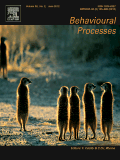
Behavioural Processes
Fostering breakthroughs in behavioral neuroscience and beyond.Behavioural Processes, published by Elsevier, is a prominent academic journal that explores the intricate dynamics of behavior across various species, providing a multidisciplinary platform for researchers in the fields of Animal Science and Zoology, Behavioral Neuroscience, and Medicine. With a rich history dating back to 1976 and expected to continue until 2024, the journal has garnered recognition, achieving a Q2 ranking in Animal Science and Zoology and securing a significant position within Scopus rankings. Behavioural Processes serves as a vital resource for advancing our understanding of behavioral mechanisms, fostering innovation in both theoretical frameworks and practical applications. Although it is not an open access journal, its rigorous peer-review process ensures high-quality publishing, making it an essential tool for professionals, researchers, and students dedicated to uncovering the complexities of behavior. For further information, please visit the journal's webpage hosted by Elsevier in Amsterdam, Netherlands.